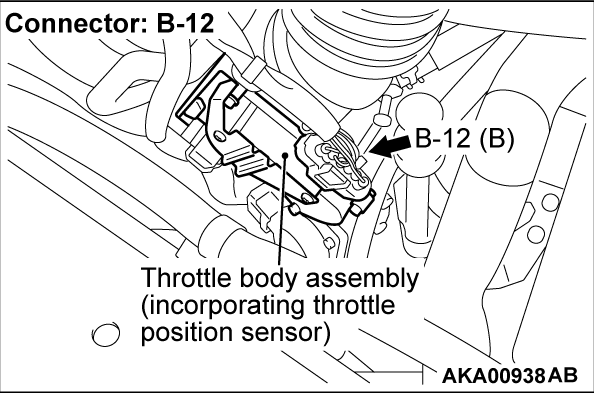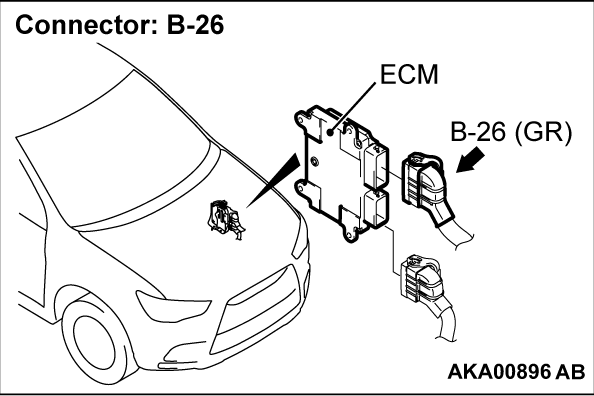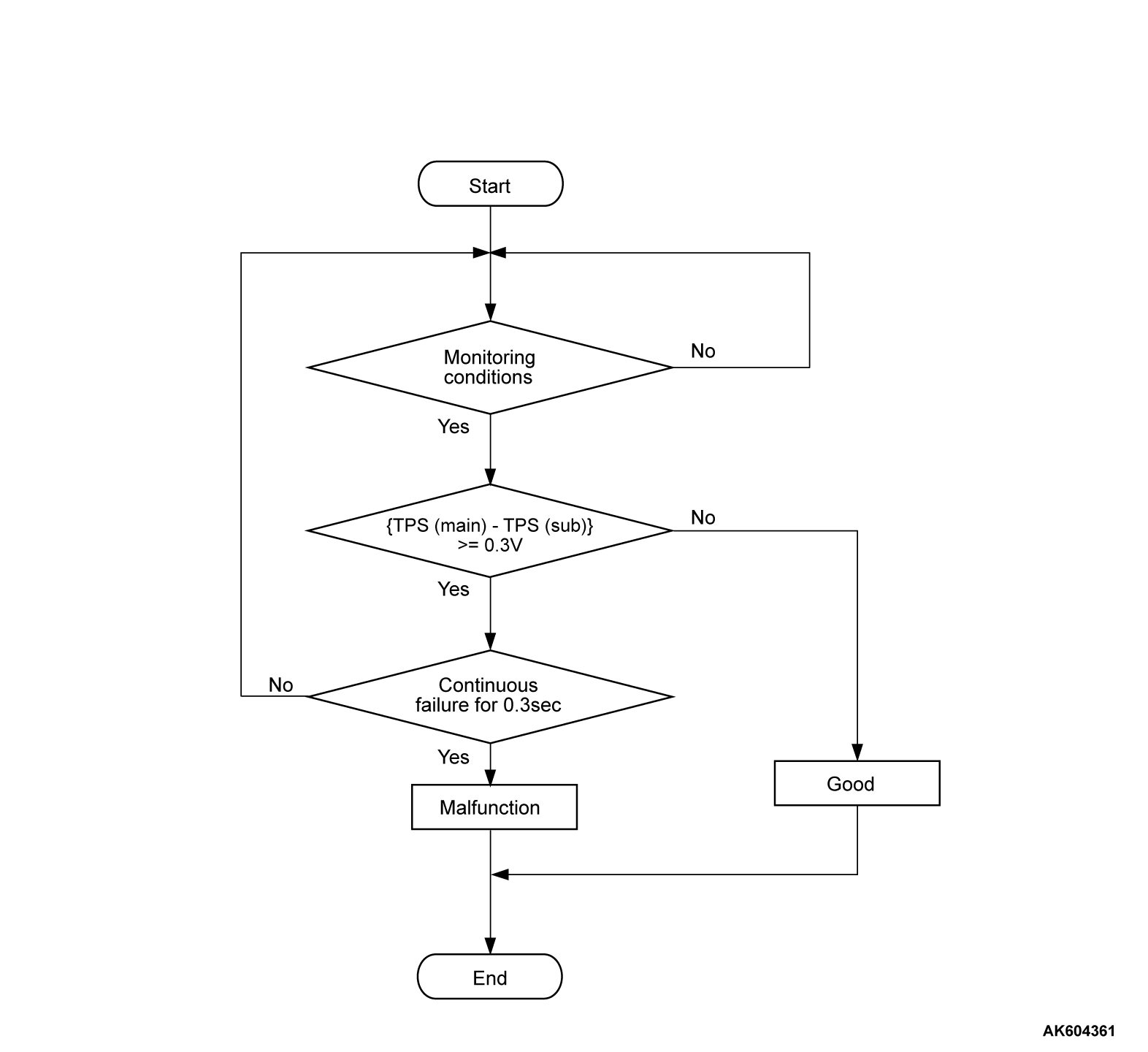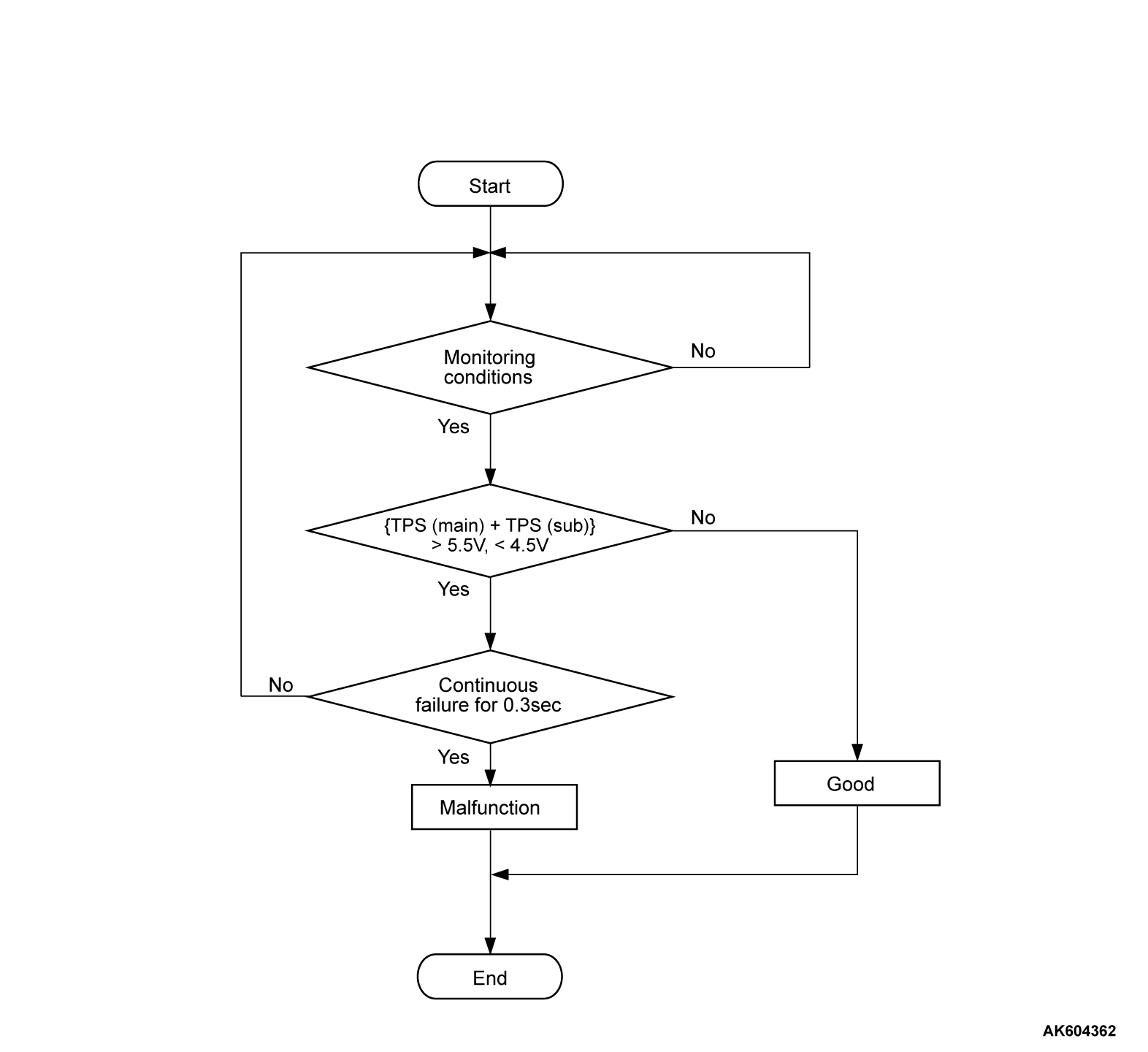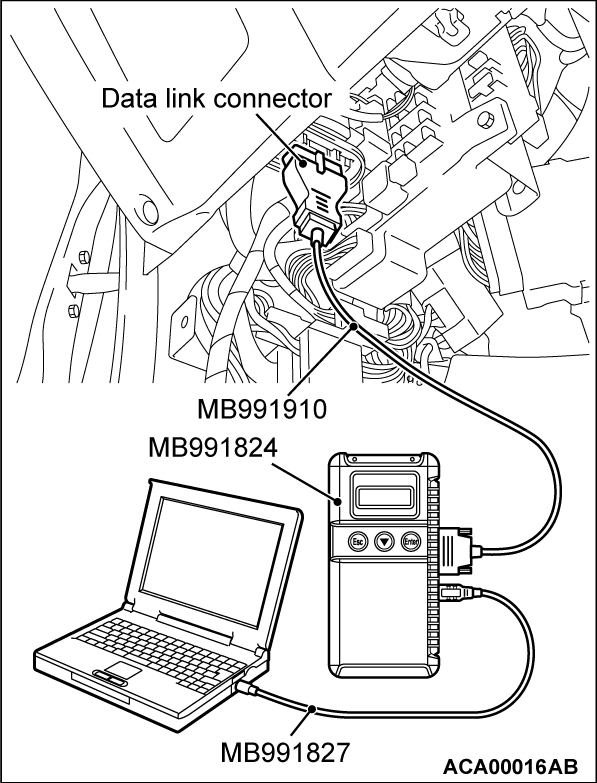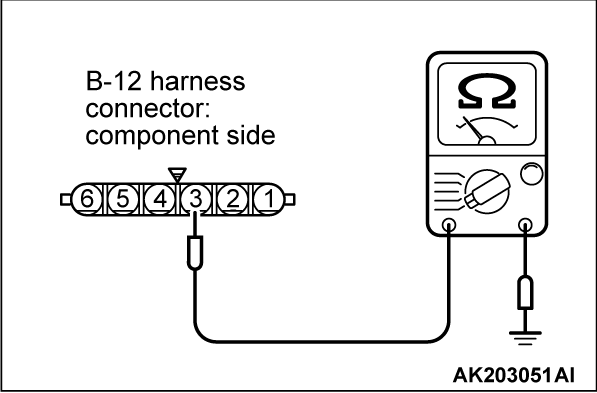DTC P2135: Throttle Position Sensor (main and sub) Range/Performance Problem
THROTTLE POSITION SENSOR (main and sub) RANGE/PERFORMANCE PROBLEM CIRCUIT
CIRCUIT OPERATION
TECHNICAL DESCRIPTION
- ECM checks the throttle position sensor output signal characteristics for abnormal conditions.
DESCRIPTIONS OF MONITOR METHODS
- Detect malfunction if the relation between throttle position sensor (main) and throttle position sensor (sub) is wrong.
MONITOR EXECUTION
- Continuous
MONITOR EXECUTION CONDITIONS (Other monitor and Sensor)
Other Monitor (There is no temporary DTC set in memory for the item monitored below)
- Not applicable
Sensor (The sensor below is determined to be normal)
- Not applicable
DTC SET CONDITIONS <Range/Performance problem-relation between main and sub>
Check Conditions
- The target output voltage of the throttle position sensor is less than 0.9 volt.
- Throttle position sensor (main) output voltage is between 0.2 and 4.8 volts.
- Throttle position sensor (sub) output voltage is between 0.2 and 4.8 volts.
- Battery positive voltage is more than 8.3 volts.
Judgment Criterion
- The difference between V1 and V2 is more than 0.3 volt for 0.3 second.
- V1: Throttle position sensor (main) output voltage
- V2: Throttle position sensor (sub) output voltage subtracted from 5 volts
Check Conditions
- Throttle position sensor (main) output voltage is between 0.2 and 4.8 volts.
- Throttle position sensor (sub) output voltage is between 0.2 and 4.8 volts.
Judgment Criterion
- For 0.3 second, the sum of the output voltage of the throttle position sensors (main) and (sub) is less than 4.5 volts, or more than 5.5 volts.
FAIL-SAFE AND BACKUP FUNCTION
- Throttle opening degree position is in default position.
OBD-II DRIVE CYCLE PATTERN
- None.
TROUBLESHOOTING HINTS (The most likely causes for this code to be set are:)
- Throttle position sensor failed.
- Harness damage in throttle position sensor circuit or connector damage.
- ECM failed.
DIAGNOSIS
Required Special Tools:
- MB991958: Scan Tool (M.U.T.-III Sub Assembly)
- MB991824: V.C.I.
- MB991827: USB Cable
- MB991910: Main Harness A
- MB991658: Test Harness
STEP 1. Using scan tool MB991958, check data list item 13: Throttle Position Sensor (main).
| caution | To prevent damage to scan tool MB991958, always turn the ignition switch to the "LOCK" (OFF) position before connecting or disconnecting scan tool MB991958. |
(1) Connect scan tool MB991958 to the data link connector.
(2) Detach the intake air hose at the throttle body.
(3) Disconnect the connector of the electronic-controlled throttle valve.
(4) Use test harness special tool (MB991658) to connect only terminals No. 3, No. 4, No. 5, and No. 6.
(5) Turn the ignition switch to the "ON" position.
(6) Set scan tool MB991958 to the data reading mode for item 13, Throttle Position Sensor (main).
- Output voltage should be between 300 and 700 millivolts when the throttle valve is fully closed with your finger.
- Output voltage should be 4,000 millivolts or more when the throttle valve is fully open with your finger.
(7) Turn the ignition switch to the "LOCK" (OFF) position.
Is the sensor operating properly?
STEP 2. Using scan tool MB991958, check data list item 15: Throttle Position Sensor (sub).
(1) Detach the intake air hose at the throttle body.
(2) Disconnect the connector of the electronic-controlled throttle valve.
(3) Use test harness special tool (MB991658) to connect only terminals No. 3, No. 4, No. 5, and No. 6.
(4) Turn the ignition switch to the "ON" position.
(5) Set scan tool MB991958 to the data reading mode for item 15, Throttle Position Sensor (sub).
- Output voltage should be 4,000 millivolts or more when the throttle valve is fully closed with your finger.
- Output voltage should be 1,000 millivolts or less when the throttle valve is fully open with your finger.
(6) Turn the ignition switch to the "LOCK" (OFF) position.
Is the sensor operating properly?
STEP 3. Check harness connector B-12 at electronic-controlled throttle valve for damage.
Is the harness connector in good condition?
STEP 4. Check the continuity at electronic-controlled throttle valve harness side connector B-12.
(1) Disconnect the connector B-12 and measure at the harness side.
(2) Check for the continuity between terminal No. 3 and ground.
- Continuity (2 ohms or less)
Does continuity exist?
STEP 5. Check harness connector B-26 at ECM for damage.
Is the harness connector in good condition?
STEP 6. Check for harness damage between electronic-controlled throttle valve connector B-12 (terminal No. 3) and ECM connector B-26 (terminal No. 13).
STEP 7. Using scan tool MB991958, read the diagnostic trouble code (DTC).
(1) Turn the ignition switch to the "ON" position.
(2) Erase the DTC.
(3) Depress the accelerator pedal fully for a few seconds.
(4) Check the DTC.
(5) Turn the ignition switch to the "LOCK" (OFF) position.
Is DTC P2135 set?
STEP 8. Check harness connector B-26 at ECM for damage.
Is the harness connector in good condition?
STEP 9. Check for harness damage between electronic-controlled throttle valve connector B-12 (terminal No. 5) and ECM connector B-26 (terminal No. 12).
STEP 10. Check for harness damage between electronic-controlled throttle valve connector B-12 (terminal No. 4) and ECM connector B-26 (terminal No. 10).
STEP 11. Check for harness damage between electronic-controlled throttle valve connector B-12 (terminal No. 6) and ECM connector B-26 (terminal No. 11).
STEP 12. Replace the throttle body assembly.
(1) Replace the throttle body assembly.
(2) Turn the ignition switch to the "ON" position.
(3) Erase the DTC.
(4) Depress the accelerator pedal fully for a few seconds.
(5) Check the DTC.
(6) Turn the ignition switch to the "LOCK" (OFF) position.
Is DTC P2135 set?
 The inspection is complete.
The inspection is complete.STEP 13. Using scan tool MB991958, read the diagnostic trouble code (DTC).
(1) Turn the ignition switch to the "ON" position.
(2) Erase the DTC.
(3) Depress the accelerator pedal fully for a few seconds.
(4) Check the DTC.
(5) Turn the ignition switch to the "LOCK" (OFF) position.
Is DTC P2135 set?
 Retry the troubleshooting.
Retry the troubleshooting. The inspection is complete.
The inspection is complete.![[Previous]](../../../buttons/fprev.png)
![[Next]](../../../buttons/fnext.png)
